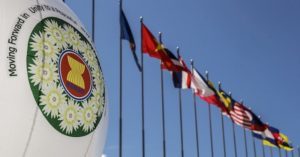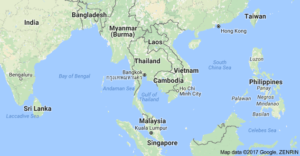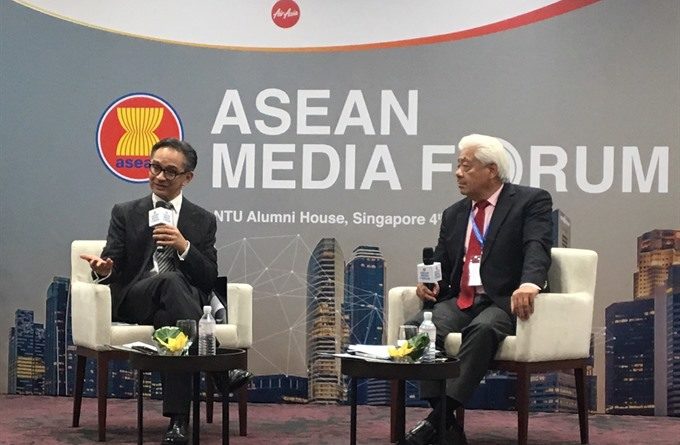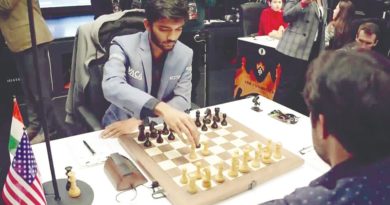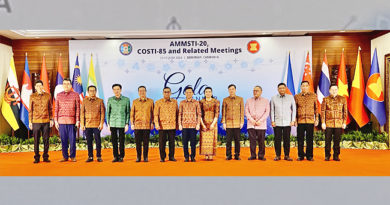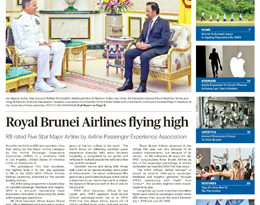51th ASEAN-2ND ASEAN Media Forum : SINGAPORE -ASEAN must be more than convener of meetings: diplomat
Former Foreign Minister of Indonesia Dr Marty Natalegawa (left) discusses the revelance of ASEAN in the next five decades at the second ASEAN Media Forum. — VNS Photo Khánh Chi
.
.
 SINGAPORE — ASEAN must deliver more than just material prosperity for its citizens if it is to remain relevant in the next five decades, says former Foreign Minister of Indonesia Marty Natalegawa.
SINGAPORE — ASEAN must deliver more than just material prosperity for its citizens if it is to remain relevant in the next five decades, says former Foreign Minister of Indonesia Marty Natalegawa.
Addressing the second ASEAN Media Forum in Singapore on Friday, Dr Marty Natalegawa said, “ASEAN must realise that people-centred ASEAN is not about material well being but also political and governance conditions.”
The Indonesian diplomat said that plans for ASEAN’s future should include reflections on what ASEAN achievements have been in the past. With that in mind, he reiterated the transformative changes that have taken place in the region.
“In trying to extrapolate and display the future, we need to look at the past five decades to remind us of how many uncertainties there are ahead of us.”
One transformative contribution by ASEAN he mentioned is that ASEAN has really transformed the nature of relations among Southeast Asian countries.
“Five decades ago ASEAN were affected by conflicts, tensions and mistrust, and yet five decades later, thanks to ASEAN, we have an ASEAN community where the notion of open conflicts among ASEAN is now less likely than ever before,” said Natalegawa.
“But we must ask ourselves whether what has been sufficient for the next five decades would be sufficient for the next five decades.”
He asserted that an outlook of business as usual by ASEAN was not good enough.
“We now have an ASEAN with peace and stability in Southeast Asia, an ASEAN political security community but at the same time I see almost like a paradox of plenty.
“We have many ASEAN instruments and frameworks but at the same time hesitance by ASEAN member countries themselves to actually make use of these instruments.”
New state practices
ASEAN members must create new state practices to make use of modalities they have before them, he added.
He emphasised the need for ASEAN to renew trust, not only among each other but also in the instruments the group had created.
Otherwise, ASEAN would be known only for its capacity to constantly have plans, visions and programmes, he said.
The second transformative contribution by ASEAN that should inform planning for the next 50 years is how ASEAN has contributed to transforming the countries of Southeast Asia into a wider region with global influence.
“Southeast Asian countries are largely owned by major countries, competitions, rivals in the region. Thanks to ASEAN efforts, the bloc has earned its centrality,” said Natalegawa.
Nevertheless, he noted that besides the issue of competition between the US and China and its implications for ASEAN, there is also the issue of tension between India and China, China and Japan and the two Koreas, among many other dynamics.
“The relevant question is so what? How can ASEAN actually navigate the situation?”
Natalegawa reiterated that rather than just defining what ASEAN centrality means, as is usually seen in documents released by working groups and senior officials’ meetings, it was essential to deliver it.
“You can’t obtain reality simply by extrapolation and mantras, you have to deliver it. What we are still missing at the moment is an ASEAN concrete manifestation of its centrality,” said the former foreign minister of Indonesia.
He was frank to say he was extremely disappointed that ASEAN had stayed silent on the issue of the Korean Peninsula.
“When there was a threat of the long-range missile to reach Guam, which is not too far away from our region, we waited for summit for ministers to say a few words,” he said.
“Now we have developments in the peninsula, the best way we can say along the line is to ensure denuclearisation. This is potentially a game-changing moment, actually. Perfection is the enemy of the good,” he said.
“ASEAN must seize this, ASEAN must lock in this process. Don’t wait until senior ministers’ meeting in July or the November summit.”
Crisis management capacity
He added that the challenge for ASEAN in the future is for members to manage events domestically and regionally, and regionally and globally.
To that end, Natalegawa called for a better and more relevant crisis management capacity in ASEAN.
“In any given year, things happen in the world without waiting for summits. So ASEAN must be a little bit more time sensitive, be seen to be proactive, and be seen as responsive.”
To be relevant in the next five decades, the bloc must have the capacity to make a difference and develop a transformative outlook towards the wider region, he noted.
“Leaders can actually lead and think of the way ahead. The decision to expand ASEAN from five to 10 members, to have the East Asia Summit, that was transformative. But we need to think outside of the box and be more transformative, even taking risks as a result.”
There were certain moments in the development of ASEAN in which the bloc found it necessary to add more wealth and raise its ambitions.
For instance, in 2002 it was Singapore that introduced the ASEAN economic community; and then Indonesia with ASEAN political and security community; and the Philippines with a social and cultural community.
Natalegawa said ASEAN needed to demonstrate relevance beyond convening power to grapple and deal with the three critical issues of geopolitical shift, trust deficit and territorial disputes.
“ASEAN has the capacity to convene meetings, but we need to be more than a meeting organiser. ASEAN must properly and concretely manifest what it wants of those meetings.” — VNS / Viet Nam News / Update: May, 06/2018 – 19:00 /
